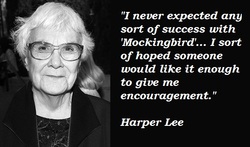Lightning flashed as the thunder clouds rolled in suddenly. It was a dark and stormy night after all. In a heartbeat, the air went from thick and humid to hot, wet, and sticky. A wolf howled in the distance as sharp sheets of rain pounded the ground like an angry gorilla, a noise as loud as a truck full of pigs crashing into a concrete embankment - and plying the pavement with pork. But the night was still too quiet in the old lawyer's ears, and when the first fang'r popped up like a Whak-a-Mole, he...was...ready.
A second heartbeat later, Atticus sprayed the veranda with lead.
(Nervously clearing my throat.)
You know, with all the hoopla surrounding Go Set A Watchman's release tomorrow, wouldn't it be funny if the book was just...BAD?

Obviously, Lee's insistence for privacy has created an aura of mystery that's fueled To Kill a Mockingbird's longevity. "Why did Harper Lee stop writing?" we wondered. "Like Finding Forrester, was it really her intention to stop after a single book?" Author Charles J. Shields published a 2006 biography of Lee entitled Mockingbird, but as Lee declined to participate in the project (all of Shields' sources were Lee's friends/acquaintances), the biography offers more in third-party anecdotes than it does in concrete answers. Harper Lee stopped granting interviews in 1965, so for the last four decades, her readers have been left no choice but to speculate - leading to the preposterous rumor that Capote (not Lee) was TKAM's true author. From what we've learned about Capote's true character, I find it far more plausible that he helped Harper Lee write, rather than doing the writing for her. It's hard to believe that someone with Capote's ego would have been able to keep his ghost-writing a secret while inhaling lines with Halsten at Studio 54. No, TKAM is definitely Harper Lee's creation all right, albeit with some very-likely late-night Holcomb motel editing.
 Capote & Lee
Capote & Lee Go Set a Watchman opens with a slow train ride that seems to set the tone for what's to come. When we first meet Jean Louise Finch, she's staring out a passenger window, watching the passing rural landscape and remembering numerous backstories that only seem to remind everyone how dull long train rides can be. Chapter One takes the reader on a lengthy expositional adventure, thumbing its nose at grabbing a reader's interest early on. Highlights include:
- Scout drinks a cup of coffee with breakfast.
- Scout reflects on reading the instructional signs on the walls of her sleeping compartment.
- A lengthy paragraph describing the backstory of a thin book of poetry, kept on somebody's coffee table.
- Scout drinks more coffee.
- A hearty paragraph-long description of Maycomb, written in the style of a County Land Survey.
- Whoops - make that three paragraphs.
- Scout's a decent tipper.
Again, I'm not being snotty. Harper Lee is an amazing writer, and To Kill a Mockingbird is an amazing book. But almost no author hits a grand slam with their first project, and there was clearly a reason that Go Set a Watchman was passed on by its publisher. And remember: Lee's publisher didn't just flat-out reject the book. He clearly saw "potential" within the story, and on his advice Lee returned with a better project. And that was the story that went on to win the Pulitzer. Even Michael Crichton was smart enough to leave Pirate Latitudes in his desk once he realized the raptors would eat Captain Phillips alive.

I guess all we can do now is just wait and see how all this unfolds. Fingers crossed, Ms. Harper Lee. And your true fans will never forget that at the end of To Kill a Mockingbird, you chose to allow Boo Radley his privacy.
And by "privacy," I mean his dignity.
